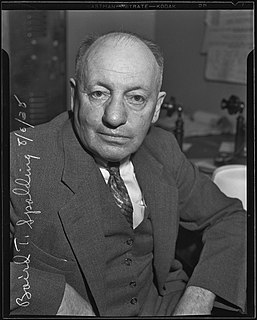A Quote by Honore de Balzac
However gross a man may be, the minute he expresses a strong and genuine affection, some inner secretion alters his features, animates his gestures, and colors his voice. The stupidest man will often, under the stress of passion, achieve heights of eloquence, in thought if not in language, and seem to move in some luminous sphere. Goriot's voice and gesture had at this moment the power of communication that characterizes the great actor. Are not our finer feelings the poems of the human will?
Quote Topics
Achieve
Actor
Affection
Colors
Communication
Eloquence
Expresses
Features
Feelings
Finer
Genuine
Gesture
Gestures
Great
Gross
Had
Heights
His
However
Human
Human Will
Inner
Language
Luminous
Man
May
Minute
Moment
Move
Often
Our
Passion
Poems
Power
Seem
Some
Sphere
Stress
Strong
Stupidest
Thought
Voice
Will
Related Quotes
Man will become immeasurably stronger, wiser, and subtler; his body will become more harmonious, his movements more rhythmic, his voice more musical. The forms of life will become dynamically dramatic. The average human type will rise to the heights of an Aristotle, a Goethe, or a Marx. And above these heights, new peaks will rise.
A man is reputed to have thought and eloquence; he cannot, for all that, say a word to his cousin or his uncle. They accuse his silence with as much reason as they would blame the insignificance of a dial in the shade. In the sun it will mark the hour. Among those who enjoy his thought, he will regain his tongue.
The moment our discourse rises above the ground-line of familiar facts, and is inflamed with passion or exalted thought, it clothes itself in images. A man conversing in earnest, if he watch his intellectual processes, will find that always a material image, more or less luminous, arises in his mind, contemporaneous with every thought, which furnishes the vestment of the thought.... This imagery is spontaneous. It is the blending of experience with the present action of the mind. It is proper creation.
Living did not become a problem until Man refused to listen to the inner voice. When he returns to listening He will seize to labor for the means of living, but will work for the joy of creating. Through His word He will find that He can move upon the all loving and all enfolding substance of God, and bring into visibility every idea he holds in thought.
There is an honesty which is but decided selfishness in disguise. The person who will not refrain from expressing his or her sentiments and manifesting his or her feelings, however unfit the time, however inappropriate the place, however painful this expression may be, lays claim, forsooth, to our approbation as an honest person, and sneers at those of finer sensibilities as hypocrites.
If we hear, in our inner ear, a voice saying we are failures, we are losers, we will never amount to anything, this is the voice of Satan trying to convince the bride that the groom does not love her. This is not the voice of God. God woos us with kindness. He changes out of character with the passion of his love.
The truly educated man is not a man who knows a bit of everything, not even the man who knows all the details of all subjects (if such a thing were possible): the “whole man” in fact, may have little detailed knowledge of facts and theories...but he will be truly in touch with the centre. He will not be in doubt about his basic convictions, about his view on the meaning and purpose of his life. He may not be able to explain these matters in words, but the conduct of his life will show a certain sureness of touch which stems from this inner clarity.
A great dread fell on him, as if he was awaiting the pronouncement of some doom that he had long foreseen and vainly hoped might after all never be spoken. An overwhelming longing to rest and remain at peace by Bilbo's side in Rivendell filled all his heart. At last with an effort he spoke, and wondered to hear his own words, as if some other will was using his small voice. "I will take the Ring," he said, "though I do not know the way.
The Internet causes billions of images to appear on millions of computer monitors around the planet. From this galaxy of sight and sound will the face of Christ emerge and the voice of Christ be heard? For it is only when his face is seen and his voice heard that the world will know the glad tidings of our redemption. This is the purpose of evangelization. And this is what will make the Internet a genuinely human space, for if there is no room for Christ, there is no room for man.
The Little Mute Boy The little boy was looking for his voice. (The king of the crickets had it.) In a drop of water the little boy was looking for his voice. I do not want it for speaking with; I will make a ring of it so that he may wear my silence on his little finger In a drop of water the little boy was looking for his voice. (The captive voice, far away, put on a cricket's clothes.) Translated by William S. Merwin






































